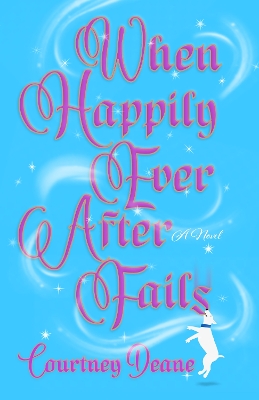Reading Courtney Deane's acknowledgment page, you quickly deduce that this is a book of therapy. Having gone through the early loss of her own parents, you soon realize that the grieving, frustration, anger, and resentment presented by Abigail are those of the author, making the story more relatable in many ways. We all process grief and find release in various methods, and "When Happily Ever After Fails" was Courtney’s.
As many would say, the only guarantee in life is death—something Shakespeare articulated in several of the classic tragedies Abigail grew up with. Daughter of a literary genius and coveted among his peers and the world at large, Abigail never believed she could outgrow the impact of his shadow until he left the world too soon after losing his battle with ALS. She might have overcome it had her mother fully stepped into the role of caregiver and nurturer, but unfortunately, she did not, and Abigail found herself sorrowfully saying goodbye to another parent. Having experienced tragedy, loss, depression, and pain so early, it’s no wonder she can’t possibly fathom subjecting the young minds in her classroom to the same ideals as she begins her new job at Excelsior Primm. While she knew she only obtained the job because of the influence of her late father (especially since a certain viral video wasn’t helping her employment chances), she decided to use the opportunity to move away from the abyss they were doomed to stare into due to the reading list and present her class with a challenge: what if the tales we loved didn’t end with death, heartbreak, and sorrow? What if we could give them the endings they deserved?
Inspired by the enthusiasm of her classroom (and somehow roped into helping the drama teacher), she convinces the principal to put on "Romeo and Juliet" but with a twist that is sure to get the community talking. When she finds out the success of the play equals the tenure of her job, Abigail finds herself rewriting her own history along with one of Shakespeare’s greatest tragedies. The problem is, happily ever afters are only in fiction, right?
As a coming-of-age “chick lit” book, I enjoyed watching the evolution of Abigail’s character. A constant back and forth, we watched her flourish in some areas while shrinking in others. Along her journey, we had the honor of meeting an array of secondary characters, each imparting wisdom and perspective that kept her on the right path. We also witnessed these same characters not achieve what may have been perceived as their happily ever after. We are reminded throughout the story that happily ever after is not real, but happiness can be found in moments, and making the most of those moments is how we build memories, character, and connections.
The recurring theme in this book was Abigail's consistent feeling of loss, whether it was her childhood, opportunities, or validation. We constantly witnessed her, in her head, go back to the voids created by the untimely deaths of her parents—not only their absence but the ghostly presence people typically tried to provide by heaping praise in their honor, which did more harm than good. We saw that despite what she grew to have, the idea of losing anything made her spiral.
While intimacy was not the focus of the story, the budding relationship between Nate and Abigail was endearing.
As Courtney's debut novel, "When Happily Ever After Fails" gave me a mental workout I can't even begin to describe. The challenge of perspective and perception, the notion of making the most and letting go, and driving home the idea of appreciating the moments life has to offer, no matter how minuscule, is what is going to make her an author to watch.
